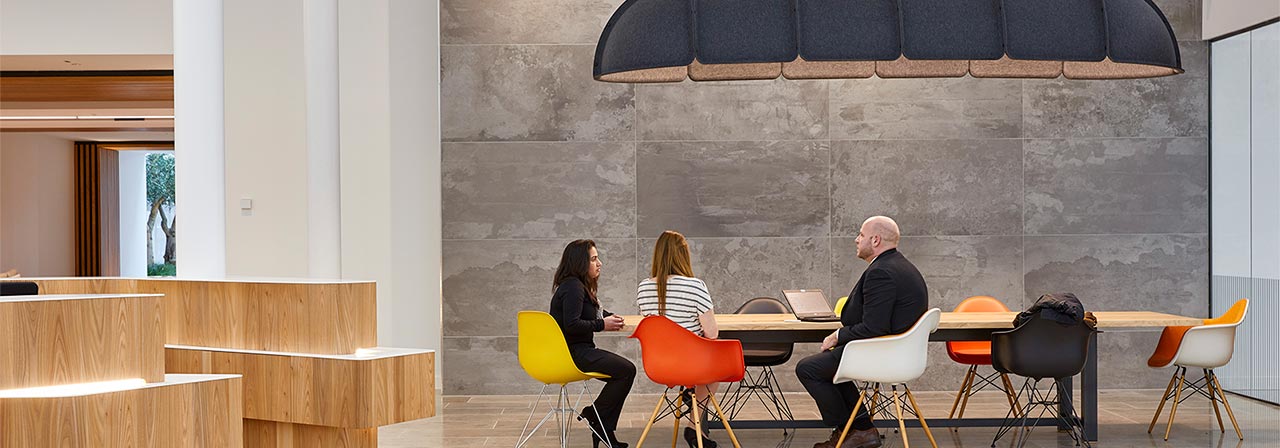Office refurbishments underway as landlords lure tenants
A wave of upgrades are coming for outdated offices as tenants demand quality
Landlords are making plans to reposition and repurpose older office buildings as part of an effort to attract tenants hunting for modern spaces that can help lure employees back after months of remote working.
Everything from traditionally-leased office floors to lobbies and end-of-trip facilities are being looked at, triggered by the shift to a hybrid work model. A JLL survey of 2,000 office workers in 10 countries shows that a majority want to work remotely up to two days a week on average – double the number before the pandemic.
In a softening rental market, refurbishments are expected to help retain and attract new tenants, protecting landlords from leasing risk, which is becoming a key factor for investors.
“There is a shopping list of capital expenditure strategies that landlords can and will get underway in their buildings as a proactive defensive strategy in the current climate,” says James Peterson, head of asset and digital development, Australia for JLL. “Tenants now want less people at workstations and would rather prioritise spaces that enhance teamwork, collaboration and innovation.”
Employees also expect the experience of the office to be worth commuting for, with food, social spaces, health and wellbeing amenities, smart technology, clean air and the highest hygiene practices, Peterson adds.
Refurbishments are already underway. This includes, a A$14 million revamp to a neglected 1980s office complex on the Brisbane River, in Queensland, Australia. Property investment and development company Wallum Partners purchased the two buildings in 2020 for A$26 million, which will get new lobbies, end-of-trip facilities, upgraded air conditioning and lifts, low-energy lighting, water-efficiency measures and extensive landscaping.
Real estate group CapitaLand has been undertaking refurbishments at is Robinson Road office tower in Singapore. It is said to be about 80 per cent leased, with tenants including European financial services firm Allianz, Japanese law firm Nishimura & Asahi, and digital infrastructure company Equinix. The landlord is confident the refurbishments will drive occupancy, especially as the building includes flexible workspace.
It is broadly understood that the work-life changes propelled by COVID-19 lockdowns won’t diminish the need for offices. Corporates are expected to retain their flagship city centre premises with good quality fit-outs to support their business culture and innovation.
However, owners of older buildings that have experienced little leasing risk over recent years due to extremely low vacancies in several global markets, face a stark turn in fortunes as tenants have more choice and will opt for amenity, flexibility and quality.
Across the Asia Pacific region it is estimated that approximately 40 percent of offices over 10 years old require some form of enhancement or refurbishment to stay relevant according to JLL data.
“There are many buildings that are well located with efficient floor plates and strong structural bones but have mounting stress inside them such as looming lease expiries. This can be mitigated with clever strategies,” Peterson says.
Refurbishments as a value driver
The prospect of decreasing valuations is also driving landlords to modernise their buildings.
In Australia, even some of the most desirable office buildings in cities are expected to fall in value by 4 percent to 7 percent in some areas, while older buildings could see declines of 20 percent, according to JLL research.
While refurbishments alone can’t reverse value declines, they can help provide support, says Martin Reynolds, head of valuations advisory in Australia for JLL.
“There is a whole basket of things that drive value, including the markets first and foremost, but also tenancy profile, rental profile, and NABERS (National Australian Built Environment Rating System) ratings,” Reynolds says. “But in totality, of course refurbishments make a difference because if the buildings you’re competing against have all those things, plus refurbished lobbies and good end-of-trip facilities and if you don’t, you’re immediately at a disadvantage in a leasing market that’s going to be soft for a while.”
Newer lobbies also offer the perception of cleanliness and safety, which are factors top of mind for businesses in the wake of COVID-19, Reynolds adds.
Meanwhile, offices left untouched could provide rich pickings for investors on the hunt for value-add opportunities, especially to create assets with strong sustainability attributes.
The next 12 months is likely to see learnings from 2020 bed in, says Anthony Couse, Asia Pacific chief executive for JLL.
“The new year may not shake off all the challenges of a pandemic-hit economy, but with recovery in many markets and new dynamics influencing how people work, live and play, 2021 could establish itself as a year where Asia Pacific enters a new cycle of real estate growth, innovation and investment,” he says.
